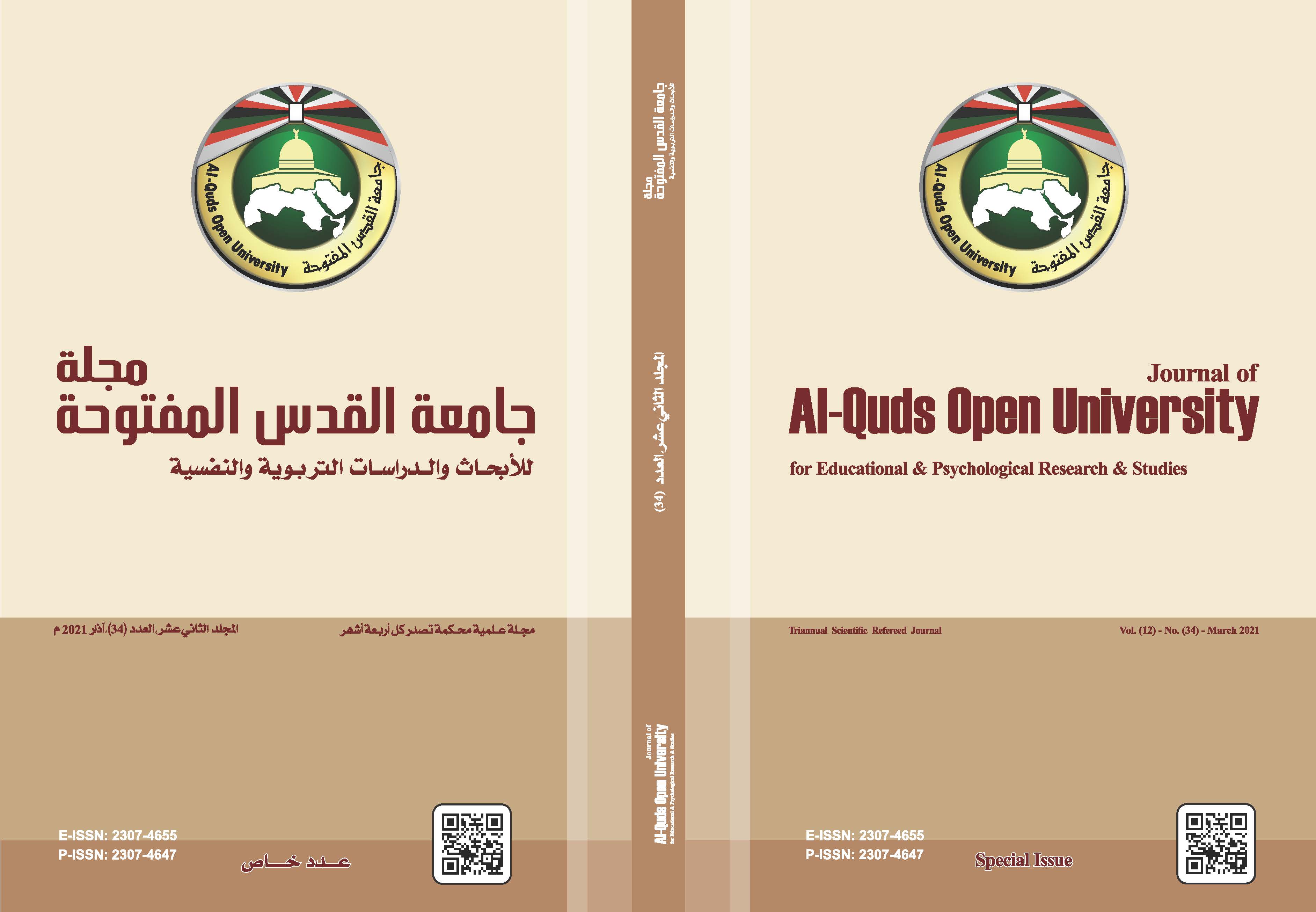الخصائص السيكومترية لمقياس "نيف" للتعاطف الذّاتي على طلبة الجامعات الفلسطينية
DOI:
https://doi.org/10.33977/1182-012-034-014الكلمات المفتاحية:
مقياس نيف، التعاطف الذاتي، طلبة الجامعات الفلسطينية.الملخص
هدفت هذه الدراسة إلى استخراج الخصائص السيكومترية لمقياس (نيف) للتعاطف الذاتي وتقنينه في البيئة الفلسطينية، ولذا فقد تم اختيار عينة عشوائية متوفرة قوامها 296 طالباً وطالبة من جامعات المحافظات الشمالية بفلسطين، وأمكن التحقق من دلالات صدق البناء وصدق الاتساق الداخلي، كما أمكن التحقق من دلالات الثبات بطريقة كرونباخ (ألفا)، وثبات الإعادة، وأسفر التّحليل العاملي بعد تدوير المحاور بطريقة فاريماكس للاختبار عن ثلاثة عوامل تشبّع بها الاختبار أطلق عليها على الترتيب: عامل الرأفة بالذات، وعامل اليقظة والوعي بالذات، وعامل الأحاسيس الإنسانية المشتركة،
كما وأسفرت الدراسة عن وجود فروق في درجات التعاطف الذاتي تعزى لجنس الطالب لصالح الإناث، وإلى وجود فروق في التفاعل بين الجنس وموقع الجامعة لصالح فئة الإناث في كل من الشمال والوسط، فيما لم تكن هناك فروقا تعزى لموقع الجامعة. وقد أوصت الدراسة بإجراء مزيد من الدراسات التي تستخدم الاختبار في بيئات عربية أخرى وكذلك على فئات عمرية أخرى.
المراجع
أولاً: المصادر والمراجع العربية
- داوود، أحمد. (2017). القدرة التنبؤية لليقظة العقلية والتعاطف الذاتي بالخلل الوظيفي لدى المرضى الاكتئاب الرئيس، رسالة ماجستير، جامعة عمان العربية.
- شاكر، عبد الحميد. (1995). علم النفس الإبداع، القاهرة: دار غريب
- العصافرة، إيهاب. (2019). التعاطف الذاتي وعلاقته بالاهتمام الاجتماعي لدى طلبة الجامعة الأردنية، مجلة الجامعة الإسلامية للدراسات التربوية 27(6): 837-855.
ثانياً: ترجمة المصادر والمراجع العربية إلى اللغة الإنجليزية
- Dawood, Ahmed (2017). Predictability of Mindfulness and Self-Compassion in Functional Impairment among Major Depression Patients, Master thesis, Amman Arab University.
- Shaker, Abel-Hameed (1995). Psychology of creativity, Cairo: Dar Alghareeb.
- Asafreh, Ehab (2019). Self-Compassion and its Relationship to the Social Interest with the University of Jordan Students. IUG Journal of Educational and Psychology Science 27(6): 837-855.
ثالثاً: المصادر والمراجع الأجنبية
- Anderson, A. (2015). Translation and Psychometric Evaluation of Neff’s Self-Compassion Scale in a Swedish Sample (Dissertation). Retrieved from http://urn.kb.se/resolve?urn=urn:nbn:se:mdh:diva-44350
- Carvalho, S., Trindade I., Gillanders D., Pinto-Gouveia J. and Castilho, P. (2019) Self-Compassion and Depressive Symptoms in Chronic Pain (CP): A 1-Year Longitudinal Study. Mindfulness 13, https://doi.org/10.1007/s12671-019-01292-7.
- Deniz, M., Kesici, S., & Sumer, A. (2008). The validity and reliability of the Turkish version of the self-compassion scale. Social Behavior and Personality, 36(9), 1151–1159. https://doi.org/10.2224/sbp.2008.36.9.1151.
- Halamova, J., Kanovsky, M., & Pacuchov, M. (2017). Self-compassion scale: IRT psychometric analysis, validation, and factor structure - Slovak translation. Psychologica Belgica, 57(4): 190–209. https://doi.org/10.5334/pb.398. Kotsou I, Leys C (2016) Self-Compassion Scale (SCS): Psychometric Properties of the French translation and its relations with psychological well-being, affect and depression. PLoS ONE 11(4).
- Krakovsky, M. (2017). The Self-Compassion Solution: Building on a Buddhist principle, psychologists are learning how being kind to yourself can bolster resilience, buffer against stress and improve relationships. Scientific American Mind, 175.
- Kumlander S, Lahtinen O, Turunen T, Salmivalli C (2018) Two is more valid than one, but is six even better? The factor structure of the Self-Compassion Scale (SCS). Plos One 13(12).
- Mosewich, A., Mack, D., Gunnell, K., & -Ferguson, L. (2018). Women athletes’ self-compassion, self-criticism, and perceived sport performance. Sport, Exercise, and Performance Psychology, 7(3), 297-307. http://dx.doi.org/10.1037/spy0000127.
- Neff, K. (2003a). Development and validation of a scale to measure self-compassion. Self and Identity, 2: 223-250
- NEFF, K. (2003b). Self-Compassion: An Alternative Conceptualization of a Healthy Attitude Toward Oneself, Self and Identity, 2: 85–101.
- Neff, K. (2012). The Science of Self-Compassion. In C. Germer & R. Siegel (Eds.), Compassion and Wisdom in Psychotherapy (pp. 79-92). New York: Guilford Press.
- Neff, K., & Dahm, K. (2015) Self-Compassion: What it is, what it does, and how it relates to mindfulness, New York: Springer.
- Muris, P., Meesters, C., Pierik, A. et al. (2016). Good for the self: Self-compassion and other self-related constructs in relation to symptoms of anxiety and depression in Non-Clinical Youths. Journal of Child and Family Studies 25(2): 607-617.
- Sanderman, R., Schroevers, J., & Lopez, A., (2018). A Close Examination of the Relationship Between Self-Compassion and Depressive Symptoms, Mindfulness, 9: 1470-1478.
- Yarnell L., Stafford R., Neff K., Reilly, E., Knox, M. & Mullarkey, M. (2015) Meta-analysis of gender differences in self-compassion. Self and Identity, 14(5):1-22.
التنزيلات
منشور
كيفية الاقتباس
إصدار
القسم
الرخصة
-
- الالتزام التام بأخلاقيات البحث العلمي.
- الالتزام التام بحقوق الملكية الفكرية.
- حقوق الطبع والنشر تؤول للمجلة.
- الحصول على موافقة المجلة لإعادة نشر البحوث أو ترجمتها.
- الالتزام التام بتعليمات هيئة تحرير المجلة.







2.png)






_2.png)

